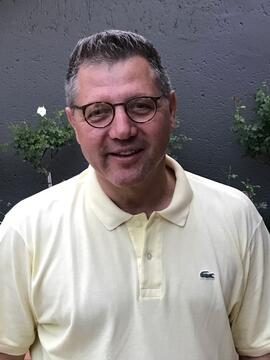Interview with Chris Daras 1976
- ZA ZAR STDS 202000738
- Unidad documental simple
- 2012
Chris Daras – 1976
Chris was a boarder at St David’s from standard 1 in 1967. In standard 6, 1972 the boarding
was closed down completely. Chris’s brother George was already a day boy and their parents
lived on the corner of Bompas Road and Jan Smuts Avenue.
Chris hated boarding, only being allowed home for one weekend a month so he was quite
pleased to become a day boy. Whilst he was a boarder he was fortunate to have a friend,
Andrew McCartney who used to invite him for Sunday breakfast. Andrew’s father was one of the
first ophthalmologists in South Africa and took Chris to work with him, it was then that Chris
decided on ophthalmology as a career.
Because of the boarding facility there were many boys from the Congo, Mozambique and other
parts of Southern Africa but when it closed many of those boys went to St John’s College and
boarded there.
Chris recalled the dining room and the kitchen where the tuck shop is now and remembers that
they were given an avocado once a week at breakfast.
On his first day Chris made friends with Neil Jacobs, now a cardiologist in Sydney; Les Pullman
who is chief financial officer for Nandos, with whom he is still in touch, the Lebos brothers,
Martin Gill, Roberto Berti, Mark Otto qualified as a dentist and then became a professional wind
surfer, John Lawrenson – professor of paediatric cardiology, Children’s Hospital C.T., John
Hazkins and Tim Parr who formed a band called “Elemental”, he was good at English and once
someone upset him in class and he just stood on a desk and kicked him. There was a golfer,
Fulton Allem who was a friend of the Kouries and Lebos families, he used to practise on the
rugby fields and ended up winning the Million Dollar Golf at Sun City. All in Chris’s group did
pretty well but some sadly have since passed away - Mark Meyer, Basil Sopas and Nick
Georgidos
The school has changed enormously. The pool was built during Chris’s time and the boys used
to play war games where the tennis courts are now. A sculptor, Baldinelli or Villa lived in the
house nearby and used to scream at the boys to be quiet and they retaliated by throwing stones
at the metal sculptures.
Of the teachers he remembers Bill Karoo who taught Biology in the high school and Chris went
with him and Heather Joseph on a trip to Europe, George Maritz, a ducktail with brylcreamed
hair and pointed shoes.
Brother Anthony was the initial headmaster followed by Br. Timothy. The dormitories were
above what is now Willy Castle’s office and Chris can remember listening to the radio broadcast
of the first landing on the moon one Sunday. He recalls Br Mario and Br Aidan and saw Br
Bernard carve the statue that now stands outside the chapel. The brothers used to make the
boarders weed the playing fields on a Saturday to keep them busy. The school did well with
horse riding with the paddocks where the grade 00 block now stands. The team won the
national schools jumping competition at Hickstead in England. Bishop Tutu came to speak to
the boys in the auditorium and began by saying he wasn’t there to make a political speech and
then proceeded to do just that. He made a big impact on many of the boys
Chris’s matric year was the year that one of the brothers took the boys out to a movie followed
by supper.
There was a rumour in his matric year that there were going to be attacks on white schools and
unbeknown to the teachers, many of the boys took guns to school. Chris was a prefect, vicecaptain
of College house and was awarded his honours blazer for studies, merit and athletics.
Chris was a runner, played rugby and sometimes captained the 2nd rugby team and was a
member of the B swimming team..
Although many of the boys didn’t realise it at the time, St David’s carried a lot of prestige with
the institutions of higher learning. St David’s also went against what the government of the day
stood for and school was important for that reason. The first black children were admitted as
pupils in 1975. That ethos came through and with many of the old boys that thinking has not
changed.
Chris didn’t do well academically but passed matric and went on to Wits University where he
studied for 5 degrees – Initially a BSc Hons in neuro-chemistry for 6 years followed by yeast
technology at Stellenbosch and then eventually he went into ophthalmology. Whilst at Wits he
joined a student march and met Philip Tobias. Chris had some money and decided to study until
the money ran out; also it was a way of avoiding the army. If you registered for under-graduate
courses you were not called up. However, in 1989 the army caught up with him and he ended
up as serving for a year as an eye doctor stationed in Pretoria with an office next door to Wouter
Basson.
Chris has two sons who are currently pupils at St David’s and he is a member of MOBS.
JLE June 2012
Egenrieder, Julie

